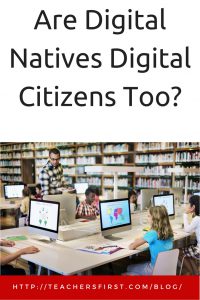 In this season of intense political activity, now might be a good time to think about digital citizenship. We cannot assume that our students who are digital natives have the skills to be good digital citizens of the virtual world in which they live every day. Many schools have some sort of cybersafety curriculum, perhaps because it is state mandated where they live. But how many schools have a fully-developed and integrated digital citizenship curriculum, not one just taught in a separate computer class or library skills period?
In this season of intense political activity, now might be a good time to think about digital citizenship. We cannot assume that our students who are digital natives have the skills to be good digital citizens of the virtual world in which they live every day. Many schools have some sort of cybersafety curriculum, perhaps because it is state mandated where they live. But how many schools have a fully-developed and integrated digital citizenship curriculum, not one just taught in a separate computer class or library skills period?
The first step to teaching our students digital citizenship is for teachers to be digitally literate themselves and to model for students the behaviors of digital citizenship. Continuing to learn about educational technology and how to integrate it in the classroom through professional development and one’s own personal learning network is essential. Let’s look at some helpful sites to broaden our understanding of this topic.
There are many models and teaching resources around this topic, but my favorite place to start is Nine Themes of Digital Citizenship developed by Mike Ribble. He defines Digital Citizenship as “the norms of appropriate, responsible behavior with regard to technology use.” He adds that “these elements have also been organized under the principles of respect, educate and protect.” He goes on to define those categories as: “Respect Your Self/Respect Others, Educate Your Self/Connect with Others and Protect Your Self/Protect Others.” I particularly like the emphasis on respecting the rights of other people, something that often is sorely missing in many curricula .
Many tech savvy teachers use the standards developed by the International Society for Technology in Education (ISTE) as a measure for themselves and their students. The new ISTE Student Standards just released in June include seven areas, one of which is Digital Citizenship defined as “Students recognize the rights, responsibilities and opportunities of living, learning and working in an interconnected digital world, and they act and model in ways that are safe, legal and ethical.”
The DQ Project focuses on this topic calling it “Digital Intelligence,” and refers to eight digital skills we must teach our children to help prepare them to live in this digital world. A colorful circle graphic helps us visualize what skills are involved, each as important and related to the others. They are Digital Identity, Digital Rights, Digital Literacy, Digital Communication, Digital Emotional Intelligence, Digital Security, Digital Safety, and Digital Use. It is quite a challenging list, but those who have technology-rich classrooms are undoubtedly working to demonstrate these competencies and continue to grow their “DQ.”
Learn more about digital citizenship and what it means to you and your students in the following resources.
From TeachersFirst:
OK2Ask: The Nine Elements of Digital Citizenship in Your Classroom –
Recording of an OK2Ask online professional development session
OK2Ask’®:Building Ethical Digital Citizens (including Copyright images)
Recording of an OK2Ask online professional development session
TeachersFirst’s Internet Safety and Digital Citizenship Resources
A special collection of 188 reviewed resources.
More Resources
Common Sense Education Digital Citizenship Materials (TeachersFirst Review)
Common Sense Media has been a leader in providing outstanding resources and curricular materials. Includes the interactive Digital Passport site.
Digital Citizenship (TeachersFirst Review)
Digital Citizenship offers a large number of resources for teaching digital citizenship for students of all ages, teachers, and parents. Choose from primary, secondary, or parents to begin.
CyberWise Digital Citizenship (TeachersFirst Review)
Provides tools for parents, educators, and kids to help them understand and use new media tools safely at home and in the classroom.
Digizen: What is Digital Citizenship (TeachersFirst Review)
Information for kids, parents, and educators on the topic of digital citizenship, includes this introductory video.
Teaching Digital Citizenship from the National Cable & Telecommunications Association Foundation. (TeachersFirst Review)
Standards-based lessons that teach digital citizenship for grades 4-8
Digital citizenship is not something we teach once a year or worse yet, once in a student’s K-12 education. At the pace of our students’ virtual lives and technological change, we have to make sure our students know how to manage the many aspects of their digital lives, not just during school hours. We should be working with administrators, technology support staff and teachers, school media specialist and most importantly, the parents of our students to be sure we acknowledge and then help students master the skills they must have to be productive digital citizens of today and the future.

